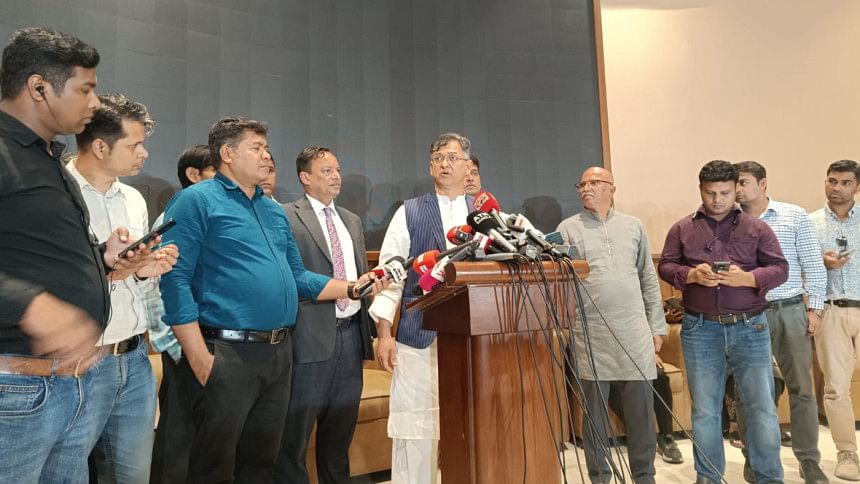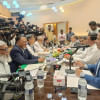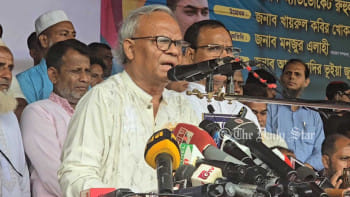Demand for polls by Dec: BNP plans talks with allies to rally support

The BNP will hold talks with like-minded political parties to come up with a comprehensive action plan to drum up support for election by December.
The decision came at the party's standing committee meeting last night, a day after a disappointing meeting with Chief Adviser Prof Muhammad Yunus.
Party leaders believe the government might be holding something back and that is why it's not coming up with a specific timeline for the election.
However, the party will not take a hard line right now. Instead, it wants to hold nationwide soft programmes, like rallies and processions on various issues, focusing on the election, to maintain momentum.
The programmes will be finalised after consultations with all like-minded political parties, sources in the standing committee said.
Party insiders said a tentative three-month action plan is ready, and its implementation would be discussed with the allies.
BNP acting chairman Tarique Rahman presided over the standing committee meeting held at the chairperson's Gulshan office.
Before the meeting, BNP Standing Committee Member Amir Khasru Mahmud Chowdhury said, "The election atmosphere is already taking shape across the country. We have to be prepared; we are heading into the pre-election phase. It's only natural that we announce pre-election programmes. Such announcements are expected."
Party leaders at last night's meeting stressed that they want to send a strong message that people across the country are eager for elections.
Earlier yesterday, BNP Standing Committee member Salahuddin Ahmed reaffirmed the party's commitment to state reforms and said that it is seriously engaging with the National Consensus Commission (NCC) to reach a consensus.
"BNP is serious about reforms. That's why we're actively discussing with the commission, point by point," he told reporters after a meeting with the NCC at the LD Hall of Jatiya Sangsad Bhaban.
He criticised the spreadsheet circulated by the NCC, saying that it "misled" political parties and created "unnecessary confusion" regarding the state reform.
He added that many proposals were missing from the spreadsheet and did not reflect the commission's detailed proposals.
"We're reviewing the core proposals and aiming for reforms that truly serve the national interest," he said.
He also expressed concerns over judiciary-related reforms, claiming that the BNP had been misled by an earlier version of the proposals sent by the Judiciary Reform Commission.
"Our proposals on judicial appointments have been mischaracterised. We want reforms, but they must be done constitutionally," he said, reaffirming BNP's stance on judicial independence.
In his introductory remarks, another BNP Standing Committee member, Nazrul Islam Khan, said that BNP has always led the way in reform initiatives.
"Before others even spoke of reforms, Begum Khaleda Zia initiated Vision 2030. Shaheed president Ziaur Rahman had presented a 19-point programme about the state reform," he said.
Nazrul said that BNP already proposed a 31-point reform agenda and would welcome better recommendations from others.
"We're evaluating the reform commission's work from that perspective. Good proposals are coming in, and we'll adopt those that will serve public interest."
He emphasised that BNP's 31-point programme is not just a declaration but a firm commitment.
"Even if the commission does not produce a formal charter, the BNP already has one -- the Charter of Reform. So, we are clearly in favour of reforms," he said.
Nazrul expressed optimism about the commission's intentions. "We believe these proposals are being made in good faith. Reform is a continuous and inevitable process -- it must happen and will evolve."
He also mentioned that the BNP delegation asked the chief adviser during Wednesday's meeting whether any party has undertaken more reform initiatives than BNP.
"BNP has brought changes across the board -- both politically and democratically. We're engaging with the commission to make the most of the opportunities created by the recent mass uprising," he added.
Earlier, while opening the dialogue, Prof Ali Riaz, NCC vice-chairman, said the objective of the discussions is to formulate a national charter that will serve as a foundation for a sustainable democratic system in Bangladesh.
"Democracy has stumbled repeatedly in our country. These talks aim to institutionalise our long-standing democratic struggles and prevent future setbacks," he said.
Prof Riaz added that a consensus had already been built with the BNP on many issues and expressed hope that remaining differences could be resolved through dialogue.
The five-member BNP delegation also included Ismail Jabiullah, BNP chairperson's advisory council member, its leaders Abu Md Muniruzzaman Khan, former public administration secretary,and Ruhul Quddus Kajol, ex-Supreme Court Lawyers Association general secretary.
The NCC officially began its journey on February 15 through a meeting with political parties.
A "July Charter", which will outline a roadmap for the future of Bangladesh, is expected to be finalised based on a consensus around reform proposals ahead of the next national election.
Earlier, the commission sent a spreadsheet with 166 reform recommendations to 39 political parties, seeking their opinions.

 For all latest news, follow The Daily Star's Google News channel.
For all latest news, follow The Daily Star's Google News channel. 




Comments